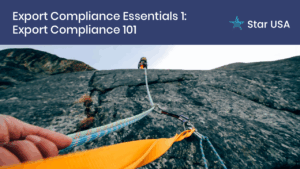Turn compliance into action. Protect your business. Take the foundations of export compliance and turn them into a practical program for your company. This session covers classification, screening, licensing, recordkeeping, training, and internal audits, with real-world examples and practical templates.…
The Power of Transparency: Voluntary Self-Disclosures
The Power of Transparency: Voluntary Self-Disclosures
In the dynamic landscape of international trade, exporters must navigate a labyrinth of regulations set forth by the Bureau of Industry and Security (BIS) to ensure adherence to export control laws. When facing potential violations or errors in export transactions, businesses can utilize the Voluntary Self-Disclosure (VSD) process to self-report such discrepancies to BIS. Here we explore the significance of VSDs, their advantages for exporters, and effective strategies for implementation within the realm of BIS regulations.
Introduction: The Voluntary Self-Disclosure (VSD) mechanism offers exporters the opportunity to proactively disclose potential violations or oversights in their export activities to the Bureau of Industry and Security (BIS). By self-reporting such issues, exporters demonstrate transparency, integrity, and a commitment to compliance with export control laws and regulations.
Key Points:
- Legal Framework: The VSD process falls under the purview of BIS regulations and guidelines. Exporters are encouraged to promptly disclose any actual or potential violations of export control laws, regulations, or procedures to BIS. This proactive approach enables exporters to rectify errors and mitigate potential penalties.
- Scope of Disclosures: VSDs can encompass a broad spectrum of issues, including improper classification of export-controlled items, unauthorized exports to embargoed countries, and failure to obtain required export licenses or authorizations. Identifying and addressing these issues through self-disclosure allows exporters to rectify mistakes and prevent future compliance lapses.
- Benefits of Self-Disclosure: VSDs offer several advantages for exporters, including the potential reduction of penalties, mitigation of enforcement actions, and preservation of export privileges. By voluntarily disclosing violations, exporters may receive leniency from BIS, demonstrating a commitment to compliance and cooperation.
Best Practices for Implementation:
- Internal Compliance Programs: Establishing robust internal compliance programs is critical for identifying and addressing potential export control violations. Exporters should provide comprehensive training to employees, conduct regular audits, and implement effective controls to prevent errors and facilitate early detection of compliance issues.
- Timely Reporting: Prompt reporting of potential violations is essential for the effectiveness of VSDs. Exporters should promptly investigate and assess the severity of any compliance discrepancies and submit VSDs to BIS in a timely manner to demonstrate good faith and cooperation.
- Cooperation with BIS: Collaboration with BIS during the VSD process is vital to achieving favorable outcomes. Exporters should fully cooperate with BIS investigators, provide accurate and complete information, and implement corrective actions to address identified issues.
Conclusion: Voluntary Self-Disclosures (VSDs) serve as a proactive tool for exporters to maintain compliance with BIS regulations and navigate the complexities of export control laws. By voluntarily reporting potential violations or errors, exporters demonstrate transparency, integrity, and a commitment to compliance. Implementing robust internal compliance programs, promptly identifying and addressing compliance discrepancies, and cooperating with BIS during the VSD process are essential for achieving favorable outcomes and safeguarding export privileges.
Sources:
Related Posts
Year-End Trade Compliance Checklist: Prepare for a Successful Year Ahead
Nic Arters Director, Star USA As our Star USA team ramps up to next year, I can’t help but reflect on the trade compliance landscape of 2025. The global trade landscape shifted with new regulations, evolving sanctions, and technological advancements, making trade compliance a moving target. Next year looks like it will be similar. …
The End of De Minimis – What does it mean for your business?
Nic Arters Director, Star USA Overview For years, Section 321 allowed for one shipment per person or business per day that was valued at or under $800.00 USD to be imported duty free or “sectioned.” However, this exemption has been deemed to be a “loophole” that will cease to exist on August 29th, 2025, following…
Top 5 Traits of Businesses that Execute Successful Trade Compliance Strategy
Michael D. Easton President & General Manager, Star USA If you think trade compliance strategy is just about checking boxes, you’re missing what the top-performing companies already know: it’s one of the smartest operational investments a business can make. In my work with global supply chain leaders, one pattern stands out. Companies that excel at…
What is Proactive Trade Compliance & How Does it Benefit Your Business?
Nic Arters Director, Star USA When the next disruption strikes your supply chain (and it will), will your company pivot or pause? I’ve spent years assisting businesses navigate the evolving maze of trade regulations, and if there’s one truth I’ve learned, it’s this: reactive compliance is no longer good enough. With global trade becoming more…


